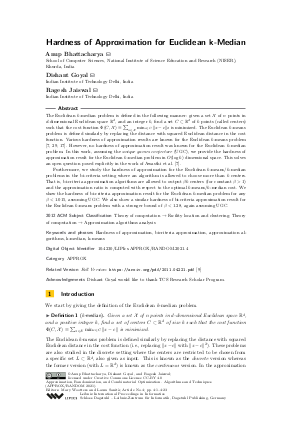@InProceedings{bhattacharya_et_al:LIPIcs.APPROX/RANDOM.2021.4,
author = {Bhattacharya, Anup and Goyal, Dishant and Jaiswal, Ragesh},
title = {{Hardness of Approximation for Euclidean k-Median}},
booktitle = {Approximation, Randomization, and Combinatorial Optimization. Algorithms and Techniques (APPROX/RANDOM 2021)},
pages = {4:1--4:23},
series = {Leibniz International Proceedings in Informatics (LIPIcs)},
ISBN = {978-3-95977-207-5},
ISSN = {1868-8969},
year = {2021},
volume = {207},
editor = {Wootters, Mary and Sanit\`{a}, Laura},
publisher = {Schloss Dagstuhl -- Leibniz-Zentrum f{\"u}r Informatik},
address = {Dagstuhl, Germany},
URL = {https://drops.dagstuhl.de/entities/document/10.4230/LIPIcs.APPROX/RANDOM.2021.4},
URN = {urn:nbn:de:0030-drops-146979},
doi = {10.4230/LIPIcs.APPROX/RANDOM.2021.4},
annote = {Keywords: Hardness of approximation, bicriteria approximation, approximation algorithms, k-median, k-means}
}

 Creative Commons Attribution 4.0 International license
Creative Commons Attribution 4.0 International license




